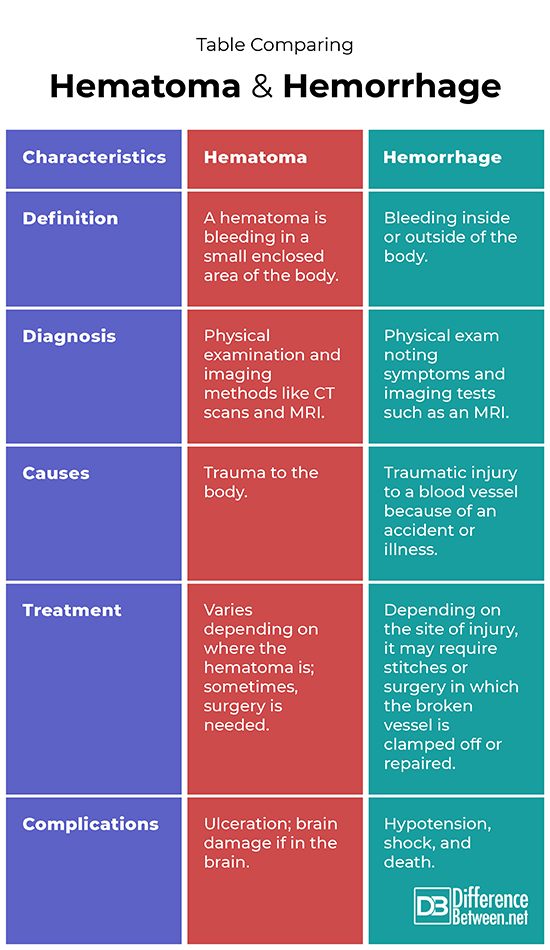Difference Between Hematoma and Hemorrhage
A hematoma is when blood leaks out of a vessel and pools in an enclosed area. Hemorrhage is bleeding that can occur outside or inside the body.

What is Hematoma?
Definition:
A hematoma can be defined as a pool of blood that collects between skin layers after an injury to a vessel.
Causes:
If a person is injured or has a traumatic event, then they often develop a hematoma because this is when blood seeps out of damaged blood vessels.
Symptoms and complications:
Signs of a hematoma range from a bruised-looking area on the skin to neurological symptoms. A brain hematoma can cause signs like headache, vomiting, and dizziness. A skin hematoma appears as a swollen, purple area.
Diagnosis:
A physical exam and imaging techniques are used for diagnosis of a hematoma. Imaging methods used to check for brain hematomas include CT scans and MRI scans.
Treatment:
Most hematomas do not need treatment, but a brain hematoma is dangerous, and often surgery is necessary.

What is Hemorrhage?
Definition:
A hemorrhage is when there is bleeding from somewhere either inside of the body or outside of the body.
Causes:
The cause of a hemorrhage is a broken blood vessel that can result from some traumatic event or illness.
Symptoms and complications:
The symptoms of hemorrhage include active bleeding, as well as low blood pressure, fast heart rate, sweaty skin, loss of consciousness, vomiting blood or passing blood per rectum.
Diagnosis:
Diagnosis of a hemorrhage can be made based on the symptoms, but, in some cases, imaging is needed for diagnosing internal hemorrhages. CT scans can show the presence of fluid in the body, which can be a sign of internal bleeding.
Treatment:
Treatment is aimed at stopping the hemorrhage. If the bleeding is from a wound, then pressure should be placed on the wound until emergency care can be given. In some cases of internal bleeding, surgery is needed to find and stop the blood loss. For some cases of GI bleeds, clips can be used to clip off bleeding vessels. The exact method depends on the reason for the bleeding and where the problem is.
Difference between Hematoma and Hemorrhage?
Definition
A hematoma is when some blood that has seeped out of blood vessels collects under the skin. A hemorrhage is active bleeding from a broken blood vessel.
Diagnosis
Hematoma diagnosis is done by physical exam and imaging methods like MRI and CT scans. MRI, CT scans and physical signs can lead to the diagnosis of a hemorrhage.
Causes
A hematoma can be due to bumping yourself; this includes a blow to the head. A hemorrhage can be because of a serious medical condition and an injury where a blood vessel is torn or severed.
Treatment
Treatment options vary, but in the case of a brain hematoma, surgical intervention may be needed. Treatment for a hemorrhage involves putting pressure on a wound or clamping and repairing the damaged blood vessel.
Complications
Hematomas can cause complications such as a sore developing or, if in the brain, neurological damage can result. A hemorrhage, if uncontrolled, can lead to low blood pressure, organ failure, and even death.
Table comparing Hematoma and Hemorrhage

Summary of Hematoma Vs. Hemorrhage
- A hematoma is when blood is found between layers of tissue.
- A hemorrhage is bleeding that occurs either inside or outside of the body.
- Both a hematoma and hemorrhage can result from some type of traumatic injury.
- Imaging tests can help establish if a person has an internal hemorrhage or a hematoma in the brain or in some other internal organ.
FAQ
What is the difference between hemorrhage and bleeding?
A hemorrhage is bleeding that is caused by a broken blood vessel.
Can a hematoma lead to hemorrhage?
A hematoma can sometimes cause hemorrhaging.
What are the 2 types of hematoma?
Hematomas can be divided into acute and chronic types. Acute hematomas occur rapidly, while chronic hematomas take a few weeks to form.
What are 3 types of hemorrhage?
Hemorrhages can be classified in various ways. One system is based on the type of blood vessel affected. The three types of hemorrhage, in that case, are arterial, venous, and capillary.
Is a hematoma considered a hemorrhage?
A hematoma is not thought of as a hemorrhage because it is only bleeding between tissue layers.
What is the difference between subdural hematoma and subdural hemorrhage?
A subdural hematoma is a pooling of blood under the dura mater, while a subdural hemorrhage is active bleeding under the dura mater.
What happens if a hematoma is left untreated?
It depends on the type of hematoma. A small hematoma caused by bumping your arm often heals on its own, but a hematoma in the brain often needs to be treated to avoid pressure placed on the brain, which can cause death.
What happens if you get a hematoma?
You will have symptoms such as a lump and bruised-looking area on the skin or some signs of brain injury (if it is in the brain).
Is a hematoma a blood clot?
A hematoma is not a blood clot. A clot is when blood has coagulated, while a hematoma is a pool of blood.
- Difference Between Rumination and Regurgitation - June 13, 2024
- Difference Between Pyelectasis and Hydronephrosis - June 4, 2024
- Difference Between Cellulitis and Erysipelas - June 1, 2024
Search DifferenceBetween.net :
Leave a Response
References :
[0]Cleveland Clinic. “Subdural hematoma”. Cleveland Clinic, 2022, https://my.clevelandclinic.org/health/diseases/21183-subdural-hematoma
[1]Holcomb, John B. "Methods for improved hemorrhage control." Critical Care 8.2 (2004): 1-4.
[2]Mao, Gordon. “Intracranial hematomas”. Merckmanuals. Merck & Co., 2022, https://www.msdmanuals.com/home/injuries-and-poisoning/head-injuries/intracranial-hematomas
